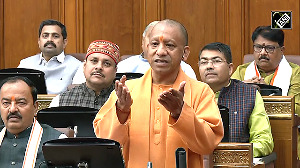 India on Wednesday blamed Pakistan for trying to revive Sikh militancy and said youth are being trained in Inter Services Intelligence facilities to carry out terror attacks in the country.
India on Wednesday blamed Pakistan for trying to revive Sikh militancy and said youth are being trained in Inter Services Intelligence facilities to carry out terror attacks in the country.
Union Home Minister Sushilkumar Shinde said there have been significant developments on the Sikh militancy front and its commanders based in Pakistan are under pressure from the ISI to further the Pakistani intelligence agency's terror plans not only in Punjab but also other parts of India.
"Sikh youth are being trained in ISI facilities in Pakistan. Interdictions and interrogations have revealed use of jailed cadres, unemployed youth, criminals and smugglers by Pak-based Sikh terror groups for facilitating terror attacks," he said addressing the conference of chief ministers on internal security.
Shinde said Sikh youth based and settled in Europe and the US were also being motivated towards militancy and a large quantity of arms, ammunition and explosives, including RDX have managed to find its way into Punjab through the borders.
He said a significant quantity of RDX has since been recovered in police action in Rajasthan and Punjab in the last one year.
The home minister said India continues to face serious challenges to its internal security scenario from Jehadi terrorists and terror groups were taking advantage of communication channels which have become more sophisticated over a period of time.
"From mobile phones, terrorists today have moved on to use of satellite phones, Thuraya sets, use of spoofed IDs and coded transactions over e-mail and chat sessions, besides Voice over Internet Protocol to communicate across the border," he said.
The home minister said India's long and porous border with Bangladesh and Nepal have been used by Pak-based jehadi groups to ex-filtrate terrorists out of India for training in Pakistan and induction of terrorist elements, hardware and finance into India.
"Jehadi tanzeems in Pakistan with affiliation to LeT, JeM and IM have set up channels for transfer of funds from Pakistan to India via Gulf and Nepal, besides using Western Union Money Transfer and hawala channel. Moreover, ex-SIMI cadres and similar militant elements based in Gulf have also been observed collecting money for causing destruction in India," he said.
Referring to Jammu and Kashmir, Shinde said the declining trend in violence continues in the state with 35.29 per cent decline in incidents in 2012 compared to 2011. There has also been a decrease in civilian and security force casualties by 51.61 per cent and 54.54 per cent respectively. The terrorist strength in the Valley has also declined.
"However, the cross border terrorist infrastructure is intact. The training camps continue -- as do the infiltration attempts. Nepal route continues to be exploited for infiltration of militants," he said.
He said there were reports that terrorist camps in Pakistan-occupied Kashmir have come down to 21 from 42 but that needed to be verified.
Shinde said to combat terrorism, there exists a very close and effective coordination amongst intelligence agencies at the Centre and State level and intelligence inputs about possible designs and threats are shared with the state governments concerned on a regular basis.
"The Multi Agency Centre has been strengthened and reorganised to enable it to function on 24x7 basis for real time collation and sharing of intelligence. This has resulted in busting of many terrorist modules and a number of possible terrorist attacks have been averted," he said.
Referring to the security situation in the North East, the home minister said suspension of operations agreements have been entered with various insurgent groups, which have shown willingness to give up violence and seek solutions for their problems peacefully within the Indian Constitution.
"Our government is ready to talk with any group or outfit which is willing to abjure violence and lay down arms," he said.
Commenting on probe of terror attacks by investigating agencies, Shinde said most of the incidents which happened after 26/11 have been worked out and in almost all the cases, accused persons have been arrested, several declared absconders and Red Corner Notices issued and charge sheets filed.
"However, a few cases like Varanasi blast, Mehrauli blast and blasts in Hyderabad and Bengaluru are under investigation and we are hopeful of a breakthrough," he said.
The home minister said India continues to face the problem of high quality state-sponsored counterfeiting and the menace of counterfeiting is assuming serious proportions because of its links with money laundering, terrorist financing and international crime syndicates.
"Indian investigating agencies have collected hardcore forensic evidence to support the conclusion that high quality counterfeit currency is being produced in our neighbouring countries and smuggled into India either directly or through other transit routes," he said.
Shinde said forensic and other technical analysis clearly indicate that fake Indian currency notes are produced in sophisticated currency printing machines using many of the raw materials and processes used to print regular currency notes.
"We live in a troubled neighbourhood and forces inimical to the country are working day in or day out to hit at the roots of our polity.
"On our part, we will continue to do our best to support the state governments to tackle the menace of terrorism. I agree that we have to go a long way in fighting this menace. At the same time, we are sure that with your cooperation we will give a firm reply to these forces of destabilisation," he said.
Image: Union Home Minister Sushilkumar Shinde addressing the CM’s conference on internal security at New Delhi’s Vigyan Bhavan
Photograph courtesy: PIB











 © 2025
© 2025